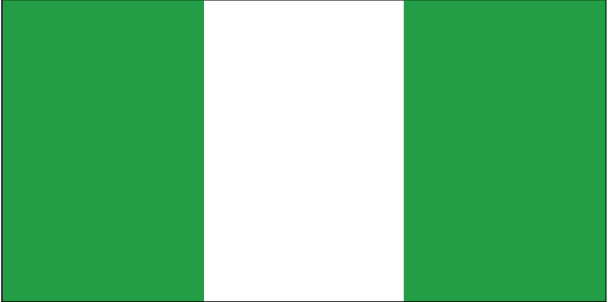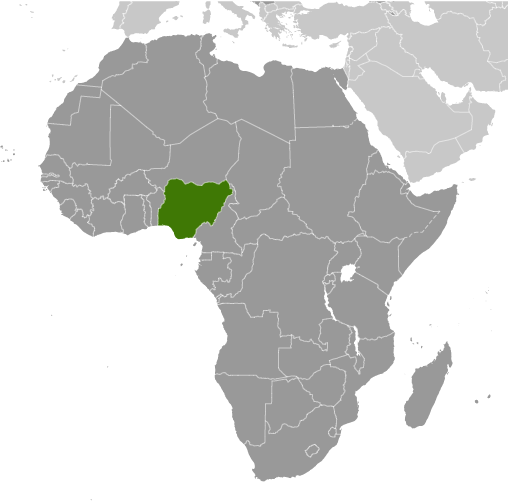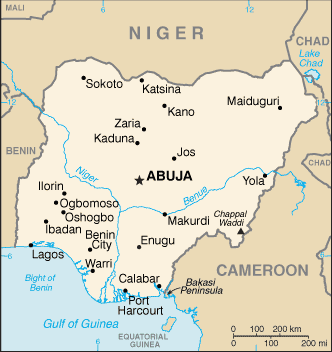British influence and control over what would become Nigeria and Africa's most populous country grew through the 19th century. A series of constitutions after World War II granted Nigeria greater autonomy; independence came in 1960. Following nearly 16 years of military rule, a new constitution was adopted in 1999, and a peaceful transition to civilian government was completed. The government continues to face the daunting task of reforming a petroleum-based economy, whose revenues have been squandered through corruption and mismanagement, and institutionalizing democracy. In addition, Nigeria continues to experience longstanding ethnic and religious tensions. Although both the 2003 and 2007 presidential elections were marred by significant irregularities and violence, Nigeria is currently experiencing its longest period of civilian rule since independence. The general elections of April 2007 marked the first civilian-to-civilian transfer of power in the country's history. In January 2010, Nigeria assumed a nonpermanent seat on the UN Security Council for the 2010-11 term.
Population
152,217,341
Country comparison to the world:8
note:estimates for this country explicitly take into account the effects of excess mortality due to AIDS; this can result in lower life expectancy, higher infant mortality, higher death rates, lower population growth rates, and changes in the distribution of population by age and sex than would otherwise be expected (July 2010 est.)
Nationality
Noun:Nigerian(s)
Adjective:Nigerian
Ethnic groups
Nigeria, Africa's most populous country, is composed of more than 250 ethnic groups; the following are the most populous and politically influential: Hausa and Fulani 29%, Yoruba 21%, Igbo (Ibo) 18%, Ijaw 10%, Kanuri 4%, Ibibio 3.5%, Tiv 2.5%
Religions
Muslim 50%, Christian 40%, indigenous beliefs 10%
Languages
English (official), Hausa, Yoruba, Igbo (Ibo), Fulani
Country Name
Conventional long form:Federal Republic of Nigeria
Conventional short form:Nigeria
Government Type
federal republic
Capital
Name:Abuja
Geographic coordinates: 9 05 N, 7 32 E
Time difference:UTC+1 (6 hours ahead of Washington, DC during Standard Time)
Administrative divisions
36 states and 1 territory*; Abia, Adamawa, Akwa Ibom, Anambra, Bauchi, Bayelsa, Benue, Borno, Cross River, Delta, Ebonyi, Edo, Ekiti, Enugu, Federal Capital Territory*, Gombe, Imo, Jigawa, Kaduna, Kano, Katsina, Kebbi, Kogi, Kwara, Lagos, Nassarawa, Niger, Ogun, Ondo, Osun, Oyo, Plateau, Rivers, Sokoto, Taraba, Yobe, Zamfara
Independence
1 October 1960 (from the UK)
National Holiday
Independence Day (National Day), 1 October (1960)
Constitution
adopted 5 May 1999; effective 29 May 1999
Legal system
based on English common law, Islamic law (in 12 northern states), and traditional law; accepts compulsory ICJ jurisdiction with reservations
Suffrage
18 years of age; universal
Executive branch
Chief of state:President Goodluck JONATHAN (since 5 May 2010, acting since 9 February 2010); note - the president is both the chief of state and head of government; JONATHAN assumed the presidency on 5 May 2010 following the death of President YAR'ADUA, he was declared Acting President on 9 February 2010 by the National Assembly during the extended illness of the former president
Head of government: President Goodluck JONATHAN (since 5 May 2010, acting since 9 February 2010)
Cabinet:Federal Executive Council
(For more information visit the World Leaders website)
Elections:president elected by popular vote for a four-year term (eligible for a second term); election last held on 21 April 2007 (next to be held in April 2011)
Election results:Umaru Musa YAR'ADUA elected president; percent of vote - Umaru Musa YAR'ADUA 69.8%, Muhammadu BUHARI 18.7%, Atiku ABUBAKAR 7.5%, Orji Uzor KALU 1.7%, other 2.3%
Legislative branch
bicameral National Assembly consists of the Senate (109 seats, 3 from each state plus 1 from Abuja; members elected by popular vote to serve four-year terms) and House of Representatives (360 seats; members elected by popular vote to serve four-year terms)
Elections:Senate - last held on 21 April 2007 (next to be held in April 2011); House of Representatives - last held on 21 April 2007 (next to be held in April 2011)
Election results:Senate - percent of vote by party - NA; seats by party - PDP 85, ANPP 16, AC 6, PPA 1, ACCORD 1; House of Representatives - percent of vote by party - PDP 65.1%, ANPP 21.6%, AC 8.8%, PPA 0.8%, LP 0.8%; seats by party - PDP 263, ANPP 63, AC 30, PPA 3, LP 1
Judicial branch
Supreme Court (judges recommended by the National Judicial Council and appointed by the president); Federal Court of Appeal (judges are appointed by the federal government from a pool of judges recommended by the National Judicial Council)
Political Parties and Leaders
Accord Party [Augustine MAZIE, acting]; Action Congress or AC [Bisi AKANDE]; All Nigeria Peoples Party or ANPP [Edwin UME-EZEOKE]; All Progressives Grand Alliance or APGA [Victor C. UMEH]; Alliance for Democracy or AD [Mojisoluwa AKINFENWA]; Conference of Nigerian Political Parities or CNPP [Abdulkadir Balarabe MUSA]; Democratic Peoples Party or DPP [Jeremiah USENI]; Fresh Democratic Party [Chris OKOTIE]; Labor Party [Dan NWANYANWU]; National Democratic Party or NDP [Aliyu Habu FARI]; Peoples Democratic Party or PDP [Vincent OGBULAFOR]; Peoples Progressive Alliance [Larry ESIN]
Political pressure groups and leaders
Academic Staff Union for Universities or ASUU; Campaign for Democracy or CD; Civil Liberties Organization or CLO; Committee for the Defense of Human Rights or CDHR; Constitutional Right Project or CRP; Human Right Africa; National Association of Democratic Lawyers or NADL; National Association of Nigerian Students or NANS; Nigerian Bar Association or NBA; Nigerian Labor Congress or NLC; Nigerian Medical Association or NMA; the press; Universal Defenders of Democracy or UDD
International organization participation
ACP, AfDB, AU, C, D-8, ECOWAS, FAO, G-15, G-24, G-77, IAEA, IBRD, ICAO, ICC, ICCt, ICRM, IDA, IDB, IFAD, IFC, IFRCS, IHO, ILO, IMF, IMO, IMSO, Interpol, IOC, IOM, IPU, ISO, ITSO, ITU, ITUC, MIGA, MINURCAT, MINURSO, MONUC, NAM, OAS (observer), OIC, OPCW, OPEC, PCA, UN, UN Security Council (temporary), UNAMID, UNCTAD, UNESCO, UNHCR, UNIDO, UNMIL, UNMIS, UNOCI, UNWTO, UPU, WCO, WFTU, WHO, WIPO, WMO, WTO
Diplomatic representation in the US
Chief of mission:Ambassador Adebowale Ibidapo ADEFUYE
Chancery:3519 International Court NW, Washington, DC 20008
Telephone:[1] (202) 986-8400
FAX: [1] (202) 775-1385
Consulate(s) general:Atlanta, New York
Diplomatic representation from the US
Chief of mission:Ambassador Robin R. SANDERS
Embassy:1075 Diplomatic Drive, Central District Area, Abuja
Mailing address:P. O. Box 5760, Garki, Abuja
Telephone:[234] (9) 461-4000
FAX:[234] (9) 461-4036
Flag description
three equal vertical bands of green (hoist side), white, and green; the color green represents the forests and abundant natural wealth of the country, white stands for peace and unity










